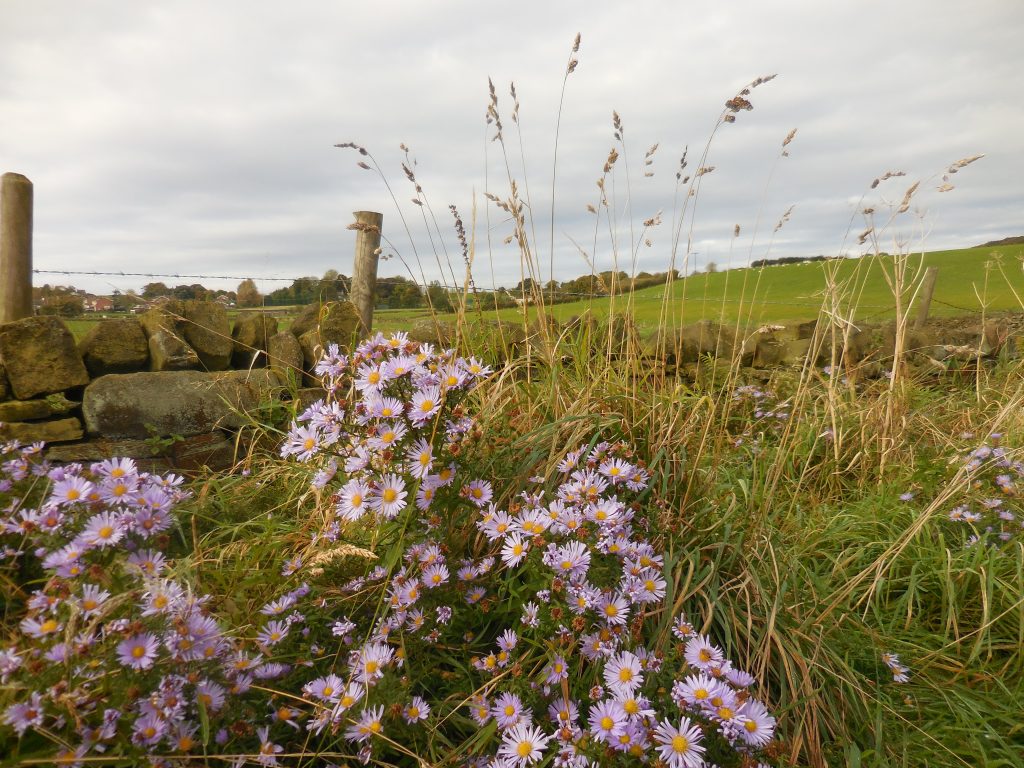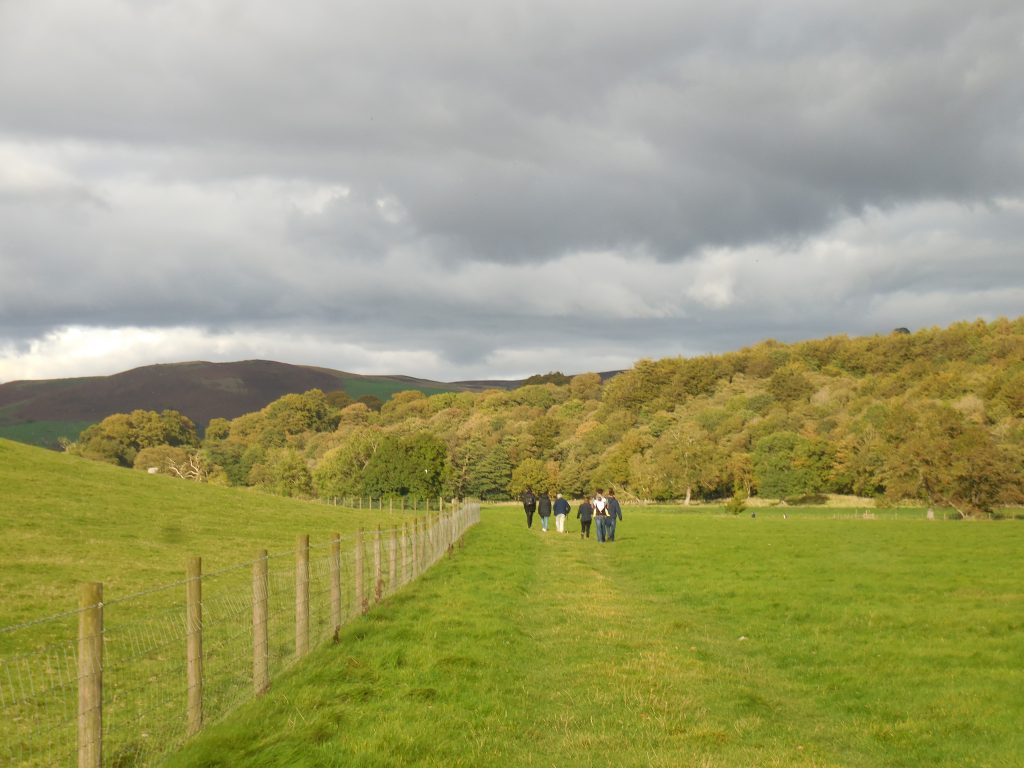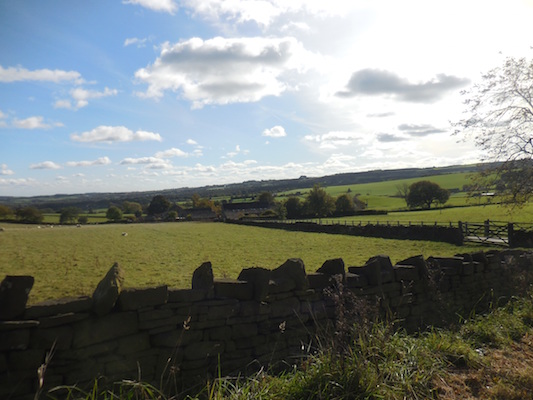We planned a trip to Haworth, the village of the Brontë sisters, today. In fact, we planned it weeks ago, ages even. We used to live here in Yorkshire when I was a girl, and now we’re back for a week-long visit.
I awake just after dawn to the sound of rumbling thunder. There was no possibility of taking a walk that day. I pull back the curtains and stand at the window, looking out at a heather sky and majestic oak trees that sway rhythmically in the semi-darkness. The north wind rattles the windowpanes and whooshes down the chimney of the farmhouse where we’re staying.
I wander downstairs and fix myself a cup of Nescafe, which I drink outside in the garden. Light drops of rain splatter into the coffee. My daughter shakes her head at me, standing barefoot on the damp gray kitchen step at the back of the farmhouse. I retreat inside.
Gradually, everyone makes their way into the kitchen for porridge, crumpets spread thickly with butter, and blueberries. We listen to “The Sun has Got His Hat On” and my husband and I dance the Charleston together; but since breakfast the cold winter wind had brought with it clouds so somber, and a rain so penetrating, that further outdoor exercise was now out of the question.
My father enters the kitchen. He has a cold and says he doesn’t want to go anywhere today, so I pick up my Kindle and begin reading Sherman Alexie’s latest book, You Don’t Have to Say You Love Me. I’m reading a lot of memoir right now, parallel to the writing of my own memoir. His is about his Native American background and the death of his mother. I am writing about the death of my brother, here in Yorkshire, 40 years ago. I’ve come back to remember.

It will take time for my three children to finish eating and get dressed. I allow them this leisure, a lazy morning on the second day of our vacation. At intervals, while turning over the leaves of my book, I studied the aspect of that winter afternoon. Afar, it offered a pale blank of mist and cloud; near a scene of wet lawn and storm-beat shrub, with ceaseless rain sweeping away wildly before a long and lamentable blast.
This is where Charlotte Brontë and I part company. I’m determined to go out for a walk on the moors of my childhood. In fact, the cold weather and rain only increases my resolve to venture out. As a child, we walked the moors almost every Sunday, bundled against the cold, heads bowed against the unforgiving wind. Gloves, scarves, raincoats, boots, and it was never enough. Back then, I resented these forced walks across the wide countryside, bracken-lined lanes and muddy thickets. But now it’s exactly what I want. I pull on my boots, zip up my old raincoat and stand at the back door, looking out at the slowly-descending clouds.
“Who’s coming with me?” I challenge, and my eldest daughter sighs, stands up, and joins me at the door. We choose a country walk from a thick file of pamphlets left by Rebecca, the owner of the farmhouse where we’re staying. We trudge along, we pause to talk to cows who stare at us disinterestedly, and we watch sheep munching in the fields. A rabbit scurries across the path, its little cottontail bobbing. An hour later, we return, our faces flushed.
My father is sitting at the table in the kitchen, his eye glasses perched at the end of his nose, a gray and red scarf wrapped loosely around his neck. He’s almost 88 and was born here in Yorkshire. He knows it like the back of his hand, although we’ve lived abroad for so long. It was his idea to visit Haworth but now he’s cancelling it — just like that. He’s found a copy of Jane Eyre on one of the shelves in his bedroom, a book I read many times as a girl, and he raises his head from the book and looks up at me as I enter the kitchen.
“Listen to this,” he says, and begins reading the first chapter out loud: “There was no possibility of taking a walk that day. But I knew you’d go out!” he says, lifting his head. I laugh and take the book from his hands. He gets up for a moment and I take his place at the table and start reading.
I read this at school in the cherry-wood library, in total silence, because even whispering was strictly forbidden. I also read it by the light of a torch under the bed covers after my mother turned out the light. I’m already remembering.
I was taken to Haworth a few times as a child, and was always fascinated by the austere parsonage where the Brontë sisters lived. Back then, I wanted to be a writer, too. Charlotte, Emily, and Anne seemed romantic and mysterious to me, living in that draughty, cramped house, with their taciturn father, and I was fascinated by the fact that they all died so young. I was also fascinated by the very fact they were sisters, because I have none, and I wondered if they were allies or enemies while growing up.

As a schoolgirl, I used to look out of the window at the chestnut trees bending in the wind and wonder where Charlotte Brontë and her sisters got their inspiration. I also remember the small mahogany desk where Charlotte Brontë wrote, returned to the parsonage just a few years ago. I was hoping to see it on this visit but it doesn’t seem to matter anymore. And now I sit at the kitchen table, and my father settles down in an easy chair behind me with his book.
I begin writing. I’m here to finish my own book. I’m thinking that coming here to Yorkshire will jog some memories. This is not to be a regular autobiography, Charlotte Brontë wrote in the voice of Jane Eyre, I am only bound to invoke Memory where I know her responses will possess some degree of interest…” So I sit here in the quiet, invoking the present rather than the past, because I like it and I want to remember it when we return home. The scrubbed wooden table, the red and white enamel teapot, the stone-flagged floor, the sloping hills and the crab-apple tree.
A horse clip-clops by, and then another.
“This is exactly as I envisioned it,” my father says behind me. I look up from my laptop.
“What?” I ask.
“The weather,” he says. “Anything less than cold and rainy wouldn’t have been worth remembering.”


